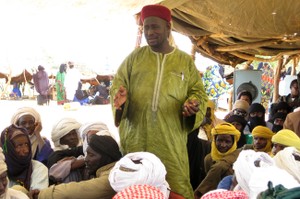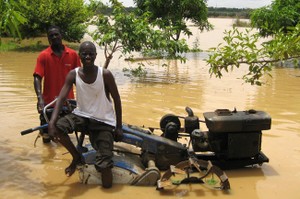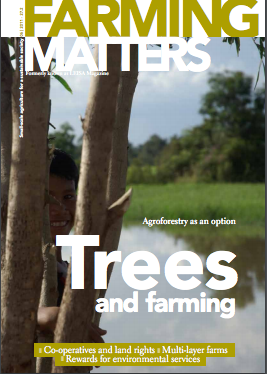Interview > Djibo Bagna – ROPPA, the West African Network of Peasant and Farmer Organisations, was founded in 2000 as a representative body that would help “make the voices of family farmers heard”. Having been involved with farmer organisations for decades, Djibo Bagna serves now as its President.
Farming Matters | 27.2 | June 2011

Ten years after it was set up, ROPPA is now an effective platform for the exchange of information between twelve West African countries.
Apart from its regular activities (such as its training programme), it organises ad hoc meetings like the one held a few weeks ago in Niamey, where representatives from each country looked at the regional agriculture programmes and discussed their role in terms of improving the availability of inputs, the quality of seeds, extension and support services and the processing of products for regional and local markets. Special attention is thus given to the role of supra-national blocks and programmes.
What does the West African Economic Community mean to farmers?
Policies for agricultural trade vary widely in the region. Most producers favour the free movement of agricultural products and they don’t think it is a good idea if one country protects its markets and another allows free movement. But we don’t have a free market, like in Europe. There are countries that are open to imports and others where the police randomly stop products at the border, which is very frustrating to farmers and traders. You must also realise that there are complementary regions in West Africa. Semi-arid or arid regions are excellent meat producers. Other regions are tropical and humid and can produce irrigated crops. The free movement of agricultural products could help feed the population of West Africa.
In our workshop we discussed how to overcome the different approaches seen in different countries. Our work is made more complicated because the producer organisations are very different from country to country. In countries with many resources, producer organisations are strong and help making policies more consistent, while in other countries there is little attention paid to local dynamics. There is no consistency between the policies of different countries in the region, so it is ROPPA’s task to help exchange information and harmonise such policies.

Is agroforestry a priority for ROPPA?
Sustainable land use is our priority, and we see agroforestry as part of the good management of natural resources. The climate is changing and all producers have to re-think their practices. It is clear that deforestation and the expansion of the Sahel are continuing. There is plenty of evidence showing that genetic diversity is diminishing: with climate change affecting our region, we risk losing thousands of trees that are well-adapted to our context. Agroforestry can be a key component for the necessary diversification of agricultural practices.
But why haven’t farmers adopted agroforestry at a large scale?
There is a historical reason why farmers have not taken up agroforestry. Policies for the management of natural resources used to be bad. The national forest services had the role of protecting trees, and they forbade farmers from utilising trees as they had done in the past.
Farmers were even jailed when they used trees growing on their own land! The forest services appropriated these trees with little respect for farmers’ properties. This led farmers to become hostile to trees and they cut down every single tree to avoid any hassle with the forestry services.
Today, we must explain that the tree belongs to the people on the farms. And more and more people understand that there are many benefits of having trees on their land. They need only a little coaching to follow agroforestry practices and in some countries, such as Niger or Mali, this is being practiced at a large scale. Even in some coastal countries you see the development of agroforestry.
Could agroforestry take over timber production from forests?
Of course! There is not much forest left in West Africa and agroforestry will take over the production of firewood and wood for construction. Most of the wood you find on rural markets is grown on farms. There are also international markets for wood. It would be a good idea to serve global markets with wood from agroforestry. Of course, it takes time to grow timber. I know that there are some places where they already grow timber for the market. Yet this is work in progress. We must develop family-farming based agroforestry systems that can produce timber which is adapted to the needs of the international market.
What is the role of pastoralists in agroforestry?
Today there are many pastoralists who start farming. They plant leguminous tree species for fodder. For example, there are camel herders who plant trees that their camels can eat and they subsequently settle down. That is a profound change in their lifestyle. Like all agriculture producers, pastoralists are being forced to change their activities. The underlying cause is climate change, which is turning our world upside down. People tell me every day how climate change affects their livelihood: rains come rarely or stop in the middle of the growing season, fields become barren and, sometimes, major flooding occurs. Complete villages were washed away in Niger last year and the river uprooted big trees. For us, climate change is actually very practical and affecting all our lives.
How do policy makers respond?
The reality in West Africa leaves us no choice. It’s not like in other countries where they have oil or gas or something else to live from. ROPPA fights for the preservation of natural resources and we think that people need to have trees in their fields. It is clear that we need policies that support agroforestry: where there are no trees, the land is barren and unproductive; where there are trees, there are opportunities to grow.
Most countries have formulated a National Action Plan for Adaptation to Climate Change. Agroforestry plays an important role in such plans. We must work at a very large scale. There are several options for organising this. The initiative may come from us, as producers, but it may also come from research, or from governments. In any case, all the actors should be involved and develop their own specific roles.
What is the role of African traditional leadership in natural resource management and agroforestry?
The role of traditional leadership differs according to local traditions. There are chiefs who only play the role of a social authority, and others have authority over land. Some are the guardians of tradition, and others the guardians of social relations. Chiefs with authority over land can also determine if a tree belongs to a farmer or not. In fact there are many chiefs at many levels, from local to national level. All play a role in agricultural development and land preservation.
Traditional chiefs can be very helpful, but they can also be dangerous for development. They can organise the people, but they can also stick to traditions and block necessary changes. There are some leaders who are very powerful and don’t have the inclination to work for development and the people suffer. There are other leaders who are sensitive and organise people in groups and development is possible under such chiefs. Projects should facilitate the constructive role of traditional leadership, particularly with reference to land tenure.
And what can landless people do?
Everywhere there are people who have no land, who cannot produce and who are extremely poor. This situation is extremely difficult. Therefore we have to make reforms and work to empower family farmers. You know, these days land is becoming scarce. If everybody wants to remain members of the big ‘agricultural family’, it is very important that we diversify.
For example, some people might remain as food crop growers and others breed cattle. Others still might engage in irrigated agriculture or horticulture and produce for the urban market. Others will engage in processing food products, while others will sell agricultural produce.
Agroforestry is yet another branch in the farming family’s activities, and the nice part is that it is synergetic and complementary to food production. In the Sahel, trees do not need watering but help to create better climatic and soil conditions for food crops. You can conclude that if we see farming as a set of different activities, you don’t need land to make a living.
What advice does ROPPA have for projects interested in agroforestry?
There is no doubt that we have to stop the degradation of natural resources by encouraging small farmers to practice agroforestry. Projects can document all the benefits of agroforestry for family farmers, the production of raw materials for industry and its benefits at a time of climate change. Projects need to keep strong links with others all so that we know that what they are doing makes good sense for the people on the ground. Given the opportunity, family farmers have the ability to restore land and develop the economy of West Africa.
More information
Please visit www.roppa.info for more information about the network.
Interview: Frank van Schoubroeck

